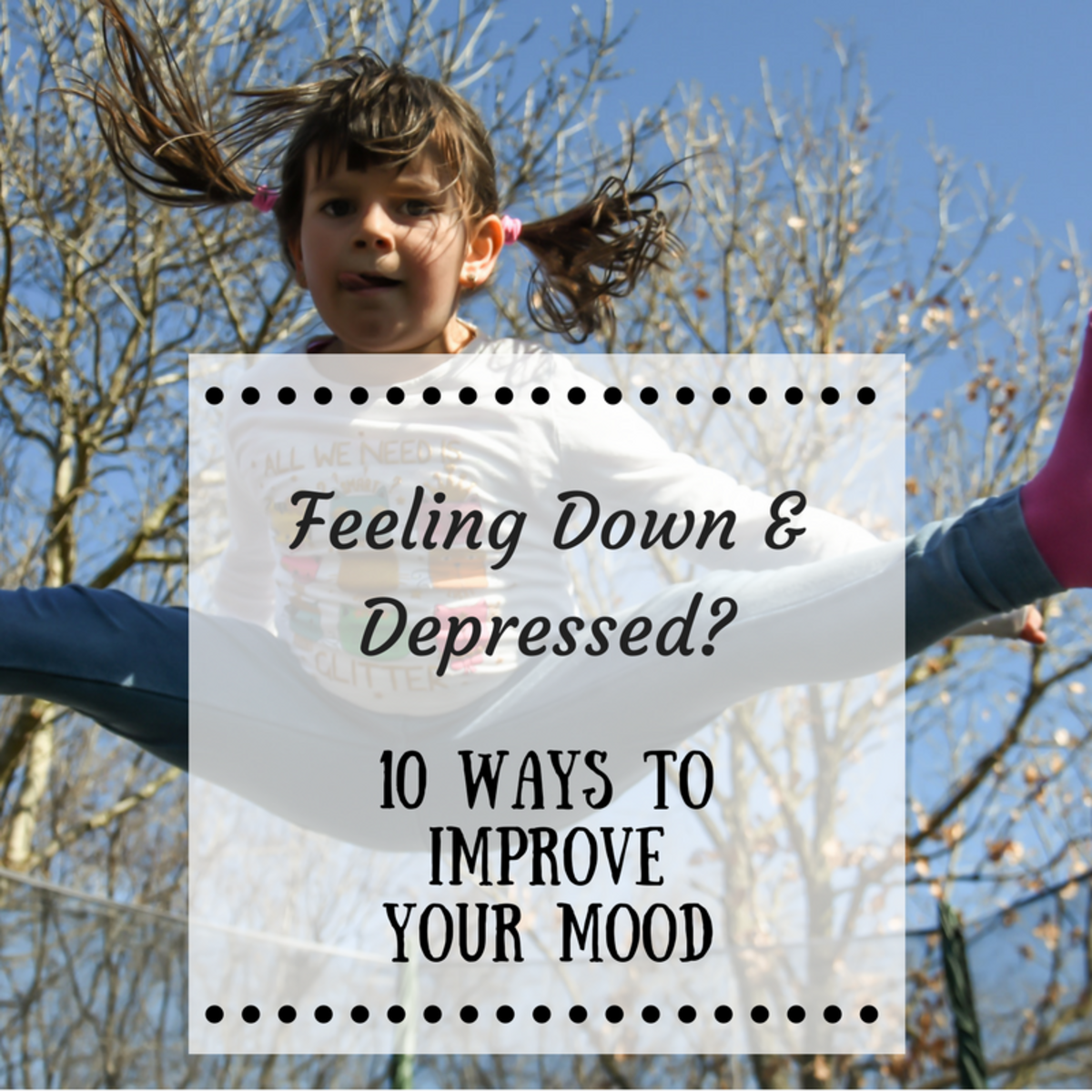Feeling Better about Yourself: 5 Steps to Feel Better Now
Feel Better Now
We all have weeks and months when the world seems a little darker, a little duller, maybe even cruel. We want to feel better now. We want to care about and value ourselves the way we know we should. External stresses from relationships, a job, or finances can weigh down our thoughts, getting in the way of healthy sleep and crippling our confidence. Meanwhile, internal dialogues can set our moods spiraling. It's no wonder that many of us don't always feel like playing in the rain.
But feeling down isn't forever.† We can do things to improve our mood today and adjust our attitudes for tomorrow. This article includes five tips for doing just that. When you've finished reading, feel free to share your own experiences dealing with the blues. What tips helped you?
†If you or someone you know might be suffering from clinical depression, get help now. While mood fluctuations are normal and will generally respond well to these tips, clinical depression has more sinister causes.

1. Write Positive
Have you ever heard the phrase "Think Positive"? Here's the reality for those of us who feel down from time to time: if we could "think positively" and solve all our problems, we would never feel down in the first place. One thing we can do to feel better about ourselves right now is to write positive. Writing down positives has a profound effect on our ability to absorb them, because what we do with our hands has a powerful effect on what we do with our brains. And while we can't always control our emotions, we can control a pencil and paper.
- Start slow: sit down somewhere comfortable with a pen and paper and write down at least five things you like about yourself. Some may have difficulty finding things to say - that's okay. Take your time. If you need to, start with superficial things: your hair, your eyes, the way you look in jeans.
- Now imagine scenarios or past events in which you've demonstrated those positives. Got a clear picture? Good. Now write about them. Do you love that you can often discern what's troubling others? Then imagine a time when that ability has truly helped someone and write about it. Don't critique the quality of your writing as you do this exercise. Let your thoughts flow freely from your mind to the paper.
- Keep this paper close to you throughout your day. Tuck it in your wallet, your purse, your briefcase, even your bra (we won't judge!).
A recent study found that self-esteem improves, psychological stress diminishes, and overall well-being increases in those who engage in value-affirming behaviors like positive writing.1

2. Engage in Positive Self-Talk
As anyone who has battled serious mental illness or played a stressful sport knows, self-talk works. It works well. Self-talk doesn't rely on genuine feeling. This is not "positive thinking" but "positive talking." Most of us feel disingenuous for the first several instances we put positive self-talk into practice, but that's okay. We're not lying to ourselves; rather, we're exposing our minds to positive sounds. Anyone can take advantage of this powerful therapy method.
- Listen to yourself think. When your boss gives you a task at work, what thoughts fly through your mind? Maybe you hear "I can't do this well" or "This is too hard." Observe how you speak to yourself internally. For most of us, we speak in neutral terms. But when we feel down, our internal self-talk becomes negative, crippling our confidence and ability to function.
- Silence or counter the negative self-talk. For most of us, this just means turning our negative self-talk into positive statements. The goal is to keep the mind open to positive possibilities.2
Example
Your friend calls up on Friday to cancel your plans for the evening. You had been looking forward to going out with a friend, but it's unlikely you'll find someone else to go with you now. You begin self-talking negatively: "This just figures. This is my life. I don't have any real friends and I'm always so alone. No one cares about me, not really." So what do you do?
- Stop your line of thinking immediately!
- Shut your eyes and take a deep breath or two, until you've centered yourself.
- Begin to self-talk positively: "I have many people who care about me, including [list names of friends and family]. I can remember when So-and-So showed that she cared for me when she helped me on Such-and-Such an occasion. I can rent a movie to watch by myself, a move that I've really wanted to see. Maybe I can even make some popcorn!"
- Silence any negative thoughts that follow, breathe deeply, and repeat if necessary.
You can harness your self-talk and you can improve your confidence and mood. Self-talk is so powerful that it even improve motor skills!3

3. Go Outside and Exercise
One of the best ways to combat the blues and feel better right now is to get outside and get moving. Not only does increased blood flow from light exercise improve cardiovascular health and flood the body with oxygen, but exposure to the sun also boosts levels of Vitamin D, which has a close relationship to mood.4 Additionally, for those of us who suffer from sleeplessness, exercise stimulates production of melatonin,5 a compound associated with circadian sleep rhythms and possibly with mood, too. Taking control of your health also creates a sense of empowerment which will benefit other areas of your life, and certainly your mood overall.
Examples of Outdoor Exercise
- Walk instead of drive somewhere.
- Go to the beach or a park and do a few yoga stretches.
- Find a U-Pick (or "Pick Your Own") farm and pick some fruit and vegetables.
- Go swimming at a local lake.
- Take a friend and go for a hike.
- Read outside, pausing every 30 minutes to stretch.
- Find a park or country trail and go for a jog.
It's incredible what a day outside can do for your mood. While you're having a blast outside, why not take some time to do Step 1?

4. Listen to Music
Music has a unique role in human psychology, one which we don't completely understand.6 We know that distinct, heavy beats affect brainwaves, which in turn leads to physiological changes. We know that people can use this knowledge to lower blood pressure and heart rates, thus diminishing physical indications of psychological stress. And though the how is unclear, we know that listening to music also improves mood.7 In fact, music is often as effective as many drugs in lifting the mood of the listener.
While music therapy refers to a specific medical therapy, anyone can take advantage of the psychological benefits of music, including you.
- Find a song or album that inspires or moves you. It can be anything that speaks in this positive way to you. Avoid music and albums that tend to drag you down or depress you. This music has a place in the arts, but for the sake of improving your mood, avoid it. Listen to this music as you clean, go for a walk, drive to work, or go about your day. Combine this self-talk for a powerful mood-enhancing formula.
- Obtain a variety of nature sounds: ocean waves, rain, wind, crickets, and jungle sounds are effective with most people. Sit in a comfortable place, or lie down if appropriate to your surroundings, and listen to your favorite nature sound with your eyes closed. Focus on your breathing, clear your mind, and relax. If you find that your mind fills with negative self-talk, use Step 2 to combat it. Do this for 10 minutes at a time.
- If you do not have time for meditation, find light, soothing music designed specifically for relaxation. Pipe this into your ears to drown out negative self-talk as you go about your day.

5. Find Reasons to Laugh
Laughter does not come easy when we're feeling down, but finding opportunities to laugh fully does more than put a temporary smile on your face. In fact, if you want to feel better now, you can do little better than give a chuckle, because laughter has powerful, scientifically-proven effects on your body and your mood.8 The good news for those of us who find it hard to laugh when we're sad is that we can fake the laughter and receive much the same benefits. Apparently, our brains seem incapable of distinguishing between faking it and making it.9 The silliness of faking mirthful laughter might even bring us to laugh mirthfully for real!
Laughter also has tangible physical effects. By laughing heartily, we improve our vascular function,10 which helps us improve everything from immune function to blood flow. And improved blood flow also means we fatigue less easily, especially during the exercise you might be trying from Step 4. At the same time, laughing lowers levels of stress hormones, which gives you an edge on the negative self-talk, feelings of being overwhelmed, and any general sleeplessness.
Here are some suggested ways to get yourself laughing:
- Find a spot where you will feel safe being noisy. Place a hand on your stomach and another on your chest. Draw a deep breath and begin laughing very loudly. You will feel silly, but that's the point. Make sure to open your mouth wide and into a smile. Laugh for 10 seconds at a time for 5 minutes.
- Watch a funny movie. Some of us have movies that always make us laugh (mine is "Monty Python and the Holy Grail"), while others may need to find something new. Invite some friends over to watch the movie with you: they don't have to know the real reason you want to laugh, but they can certainly help you to do it.
- Get silly with a loved one. Few things bring out smiles like doing something outrageous around someone who knows and loves you enough not to judge. Someone, in other words, who might decide to join in with the silliness. Laughing with a loved one has the added benefit of strengthening relational bonds and diminishing any tensions.
- Read some cartoons. You don't even have to find a newspaper. Most beloved cartoons, as well as some newer incarnations of the medium, make their content available online for free or in a purchasable digital format.
Prioritize How You Feel
The hardest step is always the first one, but you can change how you feel about yourself and feel better right now. Pick out one step at a time and do it. You deserve to feel good, to take time for yourself, and to invest in your confidence.
So often when we feel down, we think life will never get better. Counter that negative self-talk with these words:
"I am capable and deserving of good feelings and good things. I deserve to feel valuable, to myself and to others. I can choose to do this step for myself and feel better about myself today."
Outdoor Exercise Resource Video
Music & Melatonin
Works Cited
1Czech SJ, Katz AM, Orsillo SM. "The effect of values affirmation on psychological stress." Cogn Behav Ther. Epub: 2011 Jul 20. PMID: 21770847
2Senay I, Albarracin D, Noguchi K. "Motivating goal-directed behavior through introspective self-talk: the role of the interrogative form of simple future tense." Psychol Sci. 21(4):499-504. Epub: 2010 Mar 9. PMID: 20424090.
3Son V, Jackson B, Grove JR, Feltz DL. "'I am' versus 'we are': effects of distinctive variants of self-talk on efficacy beliefs and motor performance." J Sports Sci. Epub: 2011 Aug 11. PMID: 21831003.
4Kesby JP, Eyles DW, Burne TH, McGrath JJ. "The effects of vitamin D on brain development and adult brain function." Mol Cell Endocrinol. Epub: 2011 Jun 1. PMID: 21664231.
5Escames G, Ozturk G, Baño-Otálora B, Pozo MJ, Madrid JA, Reiter RJ, Serrano E, Concepción, Acuña-Castroviejo D. "Exercise and melatonin in humans: reciprocal benefits." J Pineal Res. Epub: 2011 Jul 22. PMID: 21848991.
6Maratos A, Crawford MJ, Procter S. "Music therapy for depression: it seems to work, but how?" Br J Psychiatry. 199:92-3. Epub: 2011 Aug. PMID: 21804144.
7Erkkilä J, et al. "Individual music therapy for depression: randomised controlled trial." 199:132-9. Epub: 2011 Apr 7. PMID: 21474494.
8Fonzi L, Matteucci G, Bersani G. "[Laughter and depression: hypothesis of pathogenic and therapeutic correlation]." Riv Psichiatr. 2010 Jan-Feb. 45(1):1-6. PMID: 20380236.
9Mora-Ripoll R. "The therapeutic value of laughter in medicine." Altern Ther Health Med. 2011 Nov-Dec. 16(6):56-64. PMID: 21280463.
10Sugawara J, Tarumi T, Tanaka H. "Effect of mirthful laughter on vascular function." Am J Cardiol. 2010 Sep 15. 106(6):856-9. PMID: 20816128.









